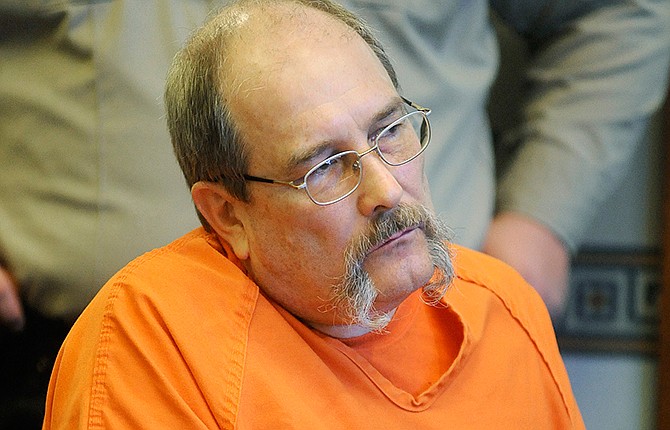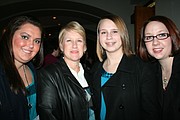Today marks the fifth anniversary of Angela and Rodney Gilpin's murders.
Thursday morning, the Missouri Supreme Court will hear arguments on David Russell Hosier's appeal of his conviction and death sentence for killing Angela, 45 - an appeal that state law says automatically must be heard by the seven-member high court.
Cole County Presiding Circuit Judge Pat Joyce imposed the death sentence 10 months ago, after a nine-man, three-woman jury from St. Charles County convicted Hosier following a late-October trial, then recommended that he be executed.
Family members couldn't be reached to comment for this story.
But during Hosier's Nov. 26 sentencing hearing, Angela's mother Barbara Eichholz said: "There is no way to express the loss of a daughter. No one should have to bury a child.
"I've lost sleep and interest to do some of the simple things in life.
"It's hard for me to believe I will never hear her giggle again."
At that same hearing, Hosier, now 59, told Joyce: "I stand here now convicted of a crime I didn't commit.
"I had a father and a cousin who were murdered, and I would never want a family to go through that.
"I know I committed adultery for having an affair with a married woman, but I did not kill her, and I didn't kill Rodney. I loved them both."
Hosier said he didn't "get a fair trial" because he wasn't able to present some favorable evidence.
The Gilpins' bodies were found about 3:30 a.m. Sept. 28, 2009, lying in the doorway of Angela's apartment in the 1100 block of West High Street, by a neighbor returning from an out-of-town trip. She called 911.
The Gilpins had been married 21 years, and were reconciling after a separation.
During that separation, Angela had dated and become friends with Hosier, who lived in an apartment on West Main Street, located across the parking lot and up the hill from where Angela lived.
Investigators and prosecutors said that, when Angela said she wanted to restore her marriage with Rodney, Hosier was angry and told others that, if she "would not come back with him," then he "would put a stop to it somehow."
Cole County Prosecutor Mark Richardson argued during the trial last October that Hosier knew Angela left about 3 a.m. to go to her job as a convenience store manager in Wardsville.
That Monday morning, Richardson said, Hosier waited in the hallway just outside her apartment door until she opened the door to leave for work, then fired a number of shots from a home-made STEN submachine gun, killing both Angela and Rodney.
Within five hours after the killings, and after police learned of the on-again off-again romance, officers applied for and received search warrants to look inside Hosier's apartment and to have AT&T "ping" Hosier's cell phone so they could locate him.
After Jefferson City officials had notified law enforcement in several states to look for Hosier and stop him as a suspect in the double murder, Oklahoma Highway Patrol officers began pursuing Hosier's car near Tahlequah, in what his appeal describes as a "moderate-speed" pursuit. At one point, his appeal attorney wrote, "one law enforcement vehicle partially blocked the road, but David went around it and continued to drive southbound."
By 11 a.m., Hosier had stopped his car, gotten out of it and asked the officers to "shoot me, and get it over with" or "end it." Officers eventually were able to handcuff him and take him into custody.
Armed with a search warrant they got after flying in to Tahlequah, the Jefferson City officials searched Hosier's car and, according to the appeal, "found a STEN submachine gun" and a number of other items, including other firearms and ammunition.
In a 121-page brief to the Supreme Court, Hosier's attorney - Assistant Public Defender Craig A. Johnston - argues the case was riddled with procedural problems from the start of the investigation, and Joyce "erred in overruling" the attorneys' motion to suppress most of the physical evidence.
The appeal says police had no probable cause to search Hosier's apartment or get AT&T to "ping" the cell phone "because the affidavit supporting the application for that order merely asserted that David had "been identified as the primary suspect in the homicide investigation' without any factual support for that conclusory assertion."
Additionally, the appeal brief argues, the court "abused its discretion" in allowing a number of pieces of evidence to be admitted - such as the list of extra weapons found in Hosier's car, apartment and storage unit - unfairly swaying the jury.
Replying for the state, Assistant Attorney General Gregory L. Barnes' 120-page brief said Hosier originally didn't list an objection to the cell phone "ping" - but, in any event, he didn't have a legal right to object because he "had no reasonable expectation of privacy in his location along public thoroughfares or in the cell location data with a cell phone that he voluntarily purchased and chose to accompany him emitted as a proxy for that location."
Barnes said police had presented enough information in its warrant applications to show "probable cause" for the search warrants.
And Hosier's absence the morning of the murders was "evidence of flight and consciousness of guilt," the state argues.
Additionally, Hosier's argument that the Oklahoma troopers had no reason to stop Hosier disappeared because "he fled from the Oklahoma police when they activated their lights and siren."


